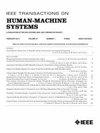hmOS: An Extensible Platform for Task-Oriented Human–Machine Computing
IF 3.5
3区 计算机科学
Q2 COMPUTER SCIENCE, ARTIFICIAL INTELLIGENCE
引用次数: 0
Abstract
With rapid advancements in artificial intelligence (AI) technologies, AI-powered machines are increasingly capable of collaborating with humans to enhance decision-making in various human–machine collaboration scenarios, e.g., medical diagnosis, criminal justice, and autonomous driving. As a result, human–machine computing (HMC) has emerged as a promising computing paradigm that integrates the expertise of humans with the reliable data processing capabilities of machines. Using HMC to facilitate the processing of domain-specific tasks has a lot of potential, but is limited in system-level scalability, i.e., there is no one common easy-to-use interface. In this article, we present human-machine operating systemhmOS:面向任务的人机计算可扩展平台
随着人工智能(AI)技术的飞速发展,人工智能驱动的机器越来越有能力与人类协作,在医疗诊断、刑事司法和自动驾驶等各种人机协作场景中增强决策能力。因此,人机计算(HMC)已成为一种前景广阔的计算模式,它将人类的专业知识与机器可靠的数据处理能力融为一体。使用 HMC 来促进特定领域任务的处理具有很大的潜力,但在系统级可扩展性方面受到限制,即没有一个通用的易于使用的界面。在本文中,我们介绍了人机操作系统(hmOS),这是一个开放的可扩展平台,供研究人员尝试使用 HMC 来研究以系统为中心的人机协作问题。为此,首先开发了底层系统架构和运行环境,为 hmOS 的内核建立了基础抽象。其次,hmOS 通过基于适宜性的任务分配机制、模糊规则指导下的质量评估以及结果调整的迭代反馈,促进了灵活的人机协作。我们在一个具有交互界面的原型中实现了新提出的 hmOS。最后,我们进行了广泛而真实的实验,验证了我们的平台在不同任务中的有效性,展示了 hmOS 的广泛可行性。
本文章由计算机程序翻译,如有差异,请以英文原文为准。
求助全文
约1分钟内获得全文
求助全文
来源期刊

IEEE Transactions on Human-Machine Systems
COMPUTER SCIENCE, ARTIFICIAL INTELLIGENCE-COMPUTER SCIENCE, CYBERNETICS
CiteScore
7.10
自引率
11.10%
发文量
136
期刊介绍:
The scope of the IEEE Transactions on Human-Machine Systems includes the fields of human machine systems. It covers human systems and human organizational interactions including cognitive ergonomics, system test and evaluation, and human information processing concerns in systems and organizations.
 求助内容:
求助内容: 应助结果提醒方式:
应助结果提醒方式:


